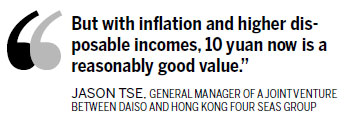10-yuan Daiso store to make foray into Guangzhou
Updated: 2012-08-15 13:32
By Li Wenfang in Guangzhou (China Daily)
|
|||||||||||
Daiso-sangyo, the Japanese bargain chain store operator, says it is confident it will become a force in local retailing, after making its first foray into the Chinese mainland, opening two "10-yuan" ($1.57) outlets in Guangzhou in June.
The stores are being run under a joint venture between Daiso and Hong Kong Four Seas Group. Most of the nearly 10,000 products it sells - ranging from sundries, food, kitchen utensils and stationery, to health and beauty products and toys - will cost 10 yuan.

Jason Tse, general manager of the joint venture, said the plan is to have three to five stores by the end of this year, 15 to 20 by 2013, and 100 in Guangdong province within five years.
Daiso runs 4,000 stores across the globe, including 3,200 in Japan.
Tse said he believes Daiso "will be the market leader" in the Chinese mainland market, given the absence of any other major chains of its kind, and what he called the largely unorganized state of the 2-yuan or 10-yuan stores that do exist.
He said Daiso chose Guangzhou as its starting city, as Four Seas already has a presence there and the city has a high per capita income.
He also said the start is perfectly timed, as the government tries to steer the economy away from an export-oriented model to one more driven by domestic consumption.
"Five to 10 years ago, people weren't impressed by a 10-yuan price-tag. Two to three years ago, you could still buy a lunch for 10 yuan.
"But with inflation and higher disposable incomes, 10 yuan now is a reasonably good value," he said.
The goods sold in the Guangzhou stores are all imported from a central distribution warehouse in Japan, although 40 percent of them are actually made in China.
Tse said the business runs under very tight margins, and its expansion in China will depend on various factors, but crucially the cost of property as Daiso stores need large spaces to operate in.
But the overall model remains the same as the one used around the world: higher sales mean lower costs, and higher income areas deliver bigger-spending customers.
Tse added that not everything will cost 10 yuan in its new stores in China, but most will.
Huang Wenjie, executive chairman of the Guangdong Chamber of Commerce, welcomed Daiso's arrival in Guangdong.
He said local buyers are pragmatic in their spending habits, and hoped that Daiso's successful business model - and its products - will bring a new impetus that might rub off on local retailers.
Shu Meng contributed to this story.
liwenfang@chinadaily.com.cn
Related Stories
China, Japan urged to boost food co-op 2012-07-26 11:22
Opportunities between China and Japan 2012-07-04 11:49
Japan vows to boost exports to China 2012-05-15 09:16
China, Japan bond over trade 2012-01-06 09:21
China encourages use of yuan, yen in trade with Japan 2011-12-26 11:07
Today's Top News
President Xi confident in recovery from quake
H7N9 update: 104 cases, 21 deaths
Telecom workers restore links
Coal mine blast kills 18 in Jilin
Intl scholarship puts China on the map
More bird flu patients discharged
Gold loses sheen, but still a safe bet
US 'turns blind eye to human rights'
Hot Topics
Lunar probe , China growth forecasts, Emission rules get tougher, China seen through 'colored lens', International board,
Editor's Picks

|

|

|

|

|

|





